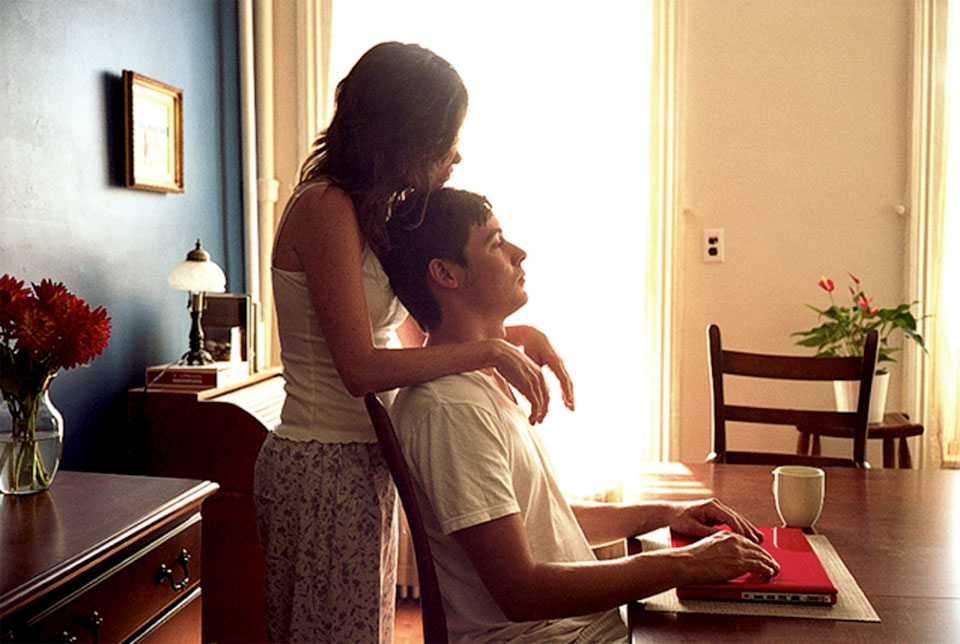Dir. by Lee Isaac Chung
There’s a sequence about 25 minutes into Lee Isaac Chung’s new film Lucky Life that I’ve watched countless times over the past few months. In an earlier scene, the film’s four main characters — old college friends who reunite each year at a beach house on the Outer Banks — are sitting around a table outside a restaurant, telling stories late into the night, and one of them, Jason (Kenyon Adams), mentions that he’s never watched the sun rise over the ocean. “Well, you have to do that,” Karen (Megan McKenna) says with enthusiasm. “We’ll do that!” In a few typically elliptical cuts, Chung then moves us from their conversation to a scene back at the beach house, which is followed soon after by the three cuts I can’t stop watching: 1. a point-of-view shot from within a car that is pulling onto a ferry, 2. a medium close-up of the back of Jason’s head, and 3. a long, high-angle shot of the four friends walking slowly onto the beach, each of them staged like a visitor to the gardens of Resnais’s Marienbad. It’s well past sunrise by the time they reach the water’s edge, but like so much of the film’s plot, this seems utterly, delightfully beside the point.
Movies about the lives of college-educated-but-still-rambling young professionals are a staple of low-budget American cinema, and it’s tempting in the opening scenes of Lucky Life to graph onto it all of the conventions of the genre. But there are several clues that Chung is up to something different here, that his cinematic points of reference extend well beyond Austin and Park City. The ferry sequence, for example, is held together by a music cue and by an oddly — and beautifully — subjective camera, the likes of which I rarely see in American film. Chung shifts regularly throughout Lucky Life from an objective perspective that captures conversations and the occasional shards of narrative to a more searching, melancholic point-of-view that is clearly designed or authored. It’s often reflected in the form itself, as he alternates between the kind of handheld photography we’ve come to think of, post-Dardennes, as “realist” and a combination of composed tracking shots and long, static takes. Isaac mentioned in a recent interview that he watched a lot of Mizoguchi before making Lucky Life; after watching the ferry scene eight or ten times, I sent him a stack of Claire Denis films. It’s that kind of subjectivity.
Another clue to Chung’s strategy is the lead performance from Daniel O’Keefe. Mark is a recognizable “indie” protagonist. He’s a 30-year-old writer and husband. He sleeps late, works on his laptop at a neighborhood coffee shop, and seems resigned to his impending fatherhood. But he’s also introverted, soft-spoken, and moody, traits that make him a difficult point of entry into the film’s world. Or, at least, I assume other viewers will have trouble empathizing with Mark. He can be a bit of a prick. (He’s also more like me than any character I’ve ever seen on screen. For an insight into all that my endlessly-patient wife has endured over the years, watch Lucky Life’s crib-building scene. I shrink in shame each time I see it.)
But Mark’s personality is somehow at the core of this film, which is deeply serious like Tarkovsky’s films are serious. Jason, we quickly discover, is dying and making what will likely be his last trip to the beach. Despite this loss and other personal trials, however, Mark shows few outward signs of mourning or emotional turmoil. He’s a young, American version of the stone-faced cipher we regularly see in art house cinema from Eastern Europe and Asia. But there’s not a shred of irony in Chung’s authorial voice. The film’s main concerns – How does one remain hopeful in the face of suffering? How can the artist transform the stuff of life into a harbinger of beauty and grace? – were heavy subjects when Tarkovsky tackled them, and they’re heavy now. The slightest wink to the audience would cripple Lucky Life, and it’s to Chung’s great credit that this deceptively ambitious film maintains its balance through to the final shot. (I’m eager to see how others respond to that shot, which is so painfully real to my own experience I can barely stand to watch it.)
A few other random observations. First, I don’t make the Tarkovsky comparison lightly. When I interviewed Isaac a few years ago about his first film, Munyurangabo, we talked a lot about Walter Benjamin’s “Theses on History,” so I was thrilled to see how Lucky Life weaves together Benjamin’s “storm of progress” with Tarkovsky’s apocalyptic visions. One particular tracking shot makes it look like ocean waves are crashing against the old beach house, just as flames consume the house at the end of The Sacrifice. The recurring recitations of Gerald Stern’s poetry, which inspired the film, and Chung’s striking use of archival footage also call to mind Tarkovsky’s Mirror.

Comments
One response to “Lucky Life (2010)”
I am very much looking forward to this film (seeing it on Monday), thanks for the early thoughts!